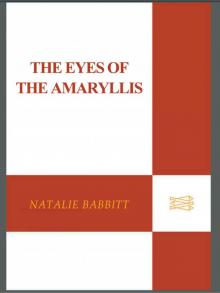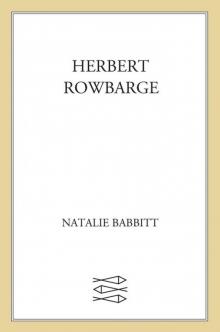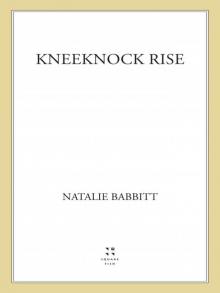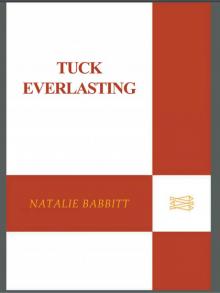- Home
- Natalie Babbitt
The Devil's Storybooks
The Devil's Storybooks Read online
Table of Contents
Title Page
The Devil’s Storybook
WISHES
THE VERY PRETTY LADY
THE HARPS OF HEAVEN
THE IMP IN THE BASKET
NUTS
A PALINDROME
ASHES
PERFECTION
THE ROSE AND THE MINOR DEMON
THE POWER OF SPEECH
The Devil’s Other Storybook
THE FORTUNES OF MADAME ORGANZA
JUSTICE
THE SOLDIER
BOATING
HOW AKBAR WENT TO BETHLEHEM
THE SIGNPOST
LESSONS
THE FALL AND RISE OF BATHBONE
SIMPLE SENTENCES
THE EAR
Books by Natalie Babbitt
Go Fish!
Goody Hall preview
Copyright Page
From his brimstone bed, at break of day,
A-walking the Devil is gone,
To look at his little snug farm of the World,
And see how his stock went on.
Over the hill and over the dale,
And he went over the plain;
And backward and forward he swished his tail,
As a gentleman swishes a cane.
ROBERT SOUTHEY (1774-1843)
The Devil’s Storybook
WISHES
ONE DAY when things were dull in Hell, the Devil fished around in his bag of disguises, dressed himself as a fairy godmother, and came up into the World to find someone to bother. He wandered down the first country road he came to and before long he met a crabby farm wife stumping along with a load of switches on her back.
“Good morning, my dear,” said the Devil in his best fairy-godmother voice. “It’s a fine day, isn’t it?”
“It’s not,” said the farm wife. “There hasn’t been a fine day in the World in twenty years.”
“That long?” said the Devil.
“That long,” she snapped.
Now, it was the Devil’s plan that morning to make a nuisance of himself by granting wishes, and he decided there was no time like now to begin. “See here then,” he said to the farm wife. “I will grant you one wish—anything at all—and that ought to cheer you up.”
“One wish?” said the farm wife.
“One,” he replied.
“Very well,” said the farm wife. “Here’s my wish. Since I don’t believe in fairy godmothers, I wish you’d go back where you came from and leave me alone.”
This wish caught the Devil off guard and before he knew it he had landed with a bump in his throne room in Hell. Up he rose, his hair on end with anger. “That’s one I’ll get someday, anyway,” he said to himself, and back he went to the World to find another victim.
The next soul he met was a very old man who sat under a tree staring away at nothing.
“Good morning, old man,” said the Devil in his best fairy-godmother voice. “It’s a fine day, isn’t it?”
“One of many,” said the old man. “One of many.”
The Devil didn’t like this answer at all. It sounded too contented. “See here then,” he said to the old man. “I will grant you one wish—anything at all—but I can guess what you’ll choose to wish for.”
“What’s that?” said the old man.
“Why,” said the Devil, “seeing as your life is nearly done, my guess is you’ll wish to be a boy again.”
The old man pulled at his whiskers for a while and then he said, “No, not that. It was good to be a boy, but not all good.”
“Then,” pursued the Devil, “you’ll wish to return to young manhood.”
“No,” said the old man. “It was good to be a young man, but still—it was difficult, too. No, that wouldn’t be my wish.”
The Devil began to feel annoyed. “Well then,” he said, “surely you’ll wish to be once more in your prime, a hearty soul of forty or fifty.”
“No,” said the old man, “I wouldn’t wish that. It was good to be forty and good to be fifty, but those times were often hard as well.”
“What age will you wish to be, then?” barked the Devil, losing his patience at last.
“Why should I want to be any age but this one?” said the old man. “That was your idea. One time is as good as another, and just as bad, too, for that matter. I’d wish for something different—I don’t know what —if I really had a wish.”
“Well,” said the Devil, “I’ve changed my mind anyway. You don’t have a wish.”
“I didn’t think I did,” said the old man, and he went back to staring away at nothing.
The Devil ground his teeth and smoke came out of his ears, but he went on down the road until at last he came to a vain young man in fancy clothes riding on a big brown horse. “Good morning, young man,” said the Devil in his best fairy-godmother voice. “It’s a fine day, isn’t it?”
“Indeed it is, dear madam,” said the vain young man, taking off his hat and bowing as well as he could from the saddle.
“Well now,” said the Devil, “you’re such a fine young man, I think I’ll grant you a wish. One wish, anything you like. What do you say to that?”
“A wish?” cried the vain young man, dropping his hat. “Anything I want? Can it really be true?”
“It can,” said the Devil, smiling. “What will you wish for?”
“Dear me!” said the vain young man. “Anything at all? I could wish to be rich, couldn’t I!”
“You could,” said the Devil.
“But on the other hand I could wish that all the girls would fall in love with me,” said the vain young man, beginning to grow excited. “Or I could wish to be the Crown Prince. Or the King! I could even wish to rule the whole World, as far as that goes.”
“You could,” said the Devil, smiling more than ever.
“Or I could wish to stay young and handsome forever,” said the vain young man.
“You could,” said the Devil.
“But wait!” cried the vain young man. “Perhaps it would be better to wish for perfect health. What good are all those other things if you’re too sick to enjoy them?”
“True,” said the Devil.
“Oh, dear,” moaned the vain young man, wringing his hands. “What to wish for! What to choose! I shall go quite mad, trying to decide! Health, power, money, love, endless youth, each a perfect wish all by itself. Sweet fairy godmother, I wish you’d tell me what to wish for!”
“If that’s what you want, all right,” said the Devil with a smile as big as the moon. “Most people think the best wish of all is to wish that every wish they ever wish will always come true.”
The young man’s eyes grew round and his cheeks paled. “Yes. Yes!” he said. “They’re right, of course. That is the best. All right, so here I go. I wish that every wish I ever wish will always come true.”
“Too late,” said the Devil gleefully.
The young man stared. “Too late?” he cried. “But why? You said I could wish for anything, didn’t you?”
“I did,” grinned the Devil. “That’s true. But you used up your wish when you wished I’d tell you what to wish for!”
And with the young man’s wail of chagrin ringing in his ears, the Devil went back down to Hell, well satisfied at last.
THE VERY PRETTY LADY
THERE WAS a very pretty lady once who lived all alone. She didn’t have to live all alone; she was so pretty that there were many young men anxious to marry her. They hung about in her dooryard and played guitars and sang sweet songs and tried to look in through the windows. They were there from dawn to dusk, always sad, always hopeful. But the very pretty lady didn’t want to marry any of them. “It’s no use being loved for t
he way one looks,” she said to herself. “If I can’t find someone who will love me in spite of my face, then I will never marry anyone at all.”
This was wise, no doubt, but no one is wise all the time. For the truth is that the very pretty lady rather liked the fact that she was pretty, and sometimes she would stand in front of the mirror and look and look at herself. At times like that she would be pleased with herself and would go out to the dooryard and talk to all the young men and let them go with her to market and carry home her bags and packages for her. And for a long time afterward they would all look a good deal more hopeful than sad.
But most of the time the very pretty lady stayed inside her cottage, feeling lonely regardless of all the young men in the dooryard, longing for someone who would love her as she wanted to be loved.
Now, after a while, one way or another, the Devil heard about the very pretty lady and he decided that she was the very thing he needed to brighten up his days in Hell. So he packed a satchel of disguises and went up to have a look at her.
He had heard how very pretty she was, but no one had told him that she never let anyone inside the cottage. He went disguised as a beggar, but she wouldn’t open the door. He tried appearing as a preacher and then as a king, but that didn’t work either. So at last he simply disguised himself as one of her suitors and hung about with the others waiting for market day.
When the pretty lady came out at last, the Devil walked beside her all the way to town, looking at her every moment, and he carried back the heaviest package. By the time she had gone inside her cottage again, his mind was made up: she was indeed exactly what he needed in Hell, and he had waited long enough to have her.
When night came and the sad and hopeful young men had all gone home the Devil threw off his disguise and wished himself into the pretty lady’s bedroom with a puff of red smoke and a noise like thunder. The pretty lady woke up at once, and when she saw him she shrieked.
“Don’t be alarmed,” said the Devil calmly. “It’s only me. I’ve come to take you away to Hell.”
“Never!” cried the pretty lady. “I shan’t go and there’s no way you can make me.”
“That’s true,” said the Devil, “there isn’t. You have to come of your own free will when you come before your time. But you’ll like it so much down there—you’ll be the prettiest thing in the place.”
“I’m that already, right here,” said the pretty lady, “for all the good it does me. Why should I go away to have the same thing somewhere else?”
“Ah, but in Hell,” said the Devil, “your beauty will last forever and ever, whereas here it can only fade.”
For the first time the pretty lady was tempted, and the Devil knew it. He fetched a mirror from her bureau and held it up in front of her so she could look at herself. “Wouldn’t it be a shame,” he coaxed, “to let such a pretty face go to waste? If you stay here, it can only last fifteen or twenty more years, but in Hell there is no time. You will look just as you do now till the stars fall and a new plan is made, and we all know that will never happen.”
The pretty lady looked at herself in the mirror and felt, as she sometimes did, that it was rather nice to be pretty, but in the nick of time she remembered what it was she really wanted. “Tell me,” she said. “Is there any love in Hell?”
“Love?” said the Devil with a shudder. “What would we want with a thing like that?”
“Well then,” said the pretty lady, pushing away the mirror, “I’ll never agree to go. You can beg all you want from now till Sunday, but it won’t be any use.”
At this the Devil grew very angry and his eyes glowed like embers. “Is that your final word?” he demanded.
“That is my final word,” she answered.
“Very well!” he said. “I can’t take you against your will, that’s true. But I can take your beauty. I can, and I will.” There was another clap of thunder and the Devil disappeared in a cloud of smoke. He went straight back to Hell and took all the pretty lady’s beauty with him, and he tacked it up in little fragments all over his throne room, where it sparkled and twinkled and brightened up the place very nicely.
After a couple of years, however, the Devil grew curious about the lady and went up to see how she was getting along. He arrived at her cottage at twilight and went to peer in through the window. And there she was, ugly as a boot, sitting down to supper. But candles lit the table and she was no longer alone. Sitting with her was a young man just as ugly as she, and in a cradle near her chair lay a very ugly baby. And the strange thing was that there was such love around the table that the Devil reeled back as if someone had struck him.
“Humph!” said the Devil to himself. “I’ll never understand this if I live to be a trillion!”
So he went back to Hell in a temper and tore down all the lady’s beauty from the walls of his throne room and threw it away, and it floated up out of Hell into a dark corner of the sky and made itself, more usefully, into a new star.
THE HARPS OF HEAVEN
THERE WERE two brothers in the World once named Basil and Jack—Basil was the fat one—a pair of mean, low, quarrelsome fellows who hated each other right from the start and would never have stayed together if it weren’t for the fact that no one else could stand them for a minute. They had begun to fight when they were babies and fought all their lives, so that one or the other was always black and blue; but still they had gone into business together and had managed to become quite famous, at least with the law, for they were positively the best thieves in the World.
There wasn’t anything that Basil and Jack couldn’t steal if they wanted to, and most of the time they wanted to. Then they would sell what they stole and spend all the money on whiskey and iodine, the first to get them ready for a fight and the second to patch them up afterward. But one night they went too far, for each in secret had bought a pistol, and in the middle of the fight they shot each other dead. However, this drastic event made very little difference between them, for when they arrived at the gates of Hell, which happened almost at once—there being no question in anyone’s mind as to where they belonged—they began another fight on the spot over who should go in first.
When the Devil heard all the commotion, he was pleased as punch. “It’s Basil and Jack!” he said to himself. “And not a moment too soon!”
Now, what the Devil meant by that was this: there was a peevish piano teacher in Hell—sent down for nagging—whose principal quarrel with the place was the music. There was bound to be better music in Heaven, she said, since they had so many lovely harps there, while in Hell, she said, there wasn’t even one harp, lovely or otherwise.
The Devil had been stung by these remarks, for he was proud of Hell. But it was all too true that he had no harps, and he had decided that the only way to get a good one was to steal it from Heaven. And the only way to do that was to send up Basil and Jack. “If anyone can steal a harp from Heaven, it’s Basil and Jack,” he said to himself, “and now at last they’re here!”
So, as soon as the brothers were settled in, the Devil had them brought to his throne room. “Basil and Jack!” he said joyfully. “Basil and Jack at last.”
“That’s us,” said Jack.
And Basil said, “None other!”
“Splendid!” said the Devil. “I’ve got a job for you.” And he went on to tell them the problem.
Well, the brothers were just as glad to get busy again, so they heard the Devil out, and the whole thing appealed to them hugely.
“That’s the stuff,” said Basil.
And Jack said, “Right!”
“You’ll need a good plan, though,” said the Devil. “A really good plan.”
“Nothing to that,” said the brothers. “There’s no job anywhere too tricky for us.”
“So I’ve heard,” said the Devil, “and I hope it’s true. I’ve set my heart, such as it is, on having a harp in Hell. I can’t go up myself—they’d know me in a minute. But you two can do it if anyone can.”
/>
So Basil and Jack thought up a plan, and the plan was to disguise themselves as angels. “We’ll just go up all sweet-like,” they said, “and pretend to have lost our way. Then we’ll slip in, grab the merchandise, slip out, and be back in time for supper.”
“Splendid!” said the Devil, and he gave them the costumes they needed and sent them on their way.
It took a good while to get there, for they had to pass round the World on the way, and the wings the Devil gave them took time to get used to. But at least they didn’t fight, for neither wanted to spoil his costume, and after a while they arrived at the gates of Heaven, out of breath but full of confidence.
Now, confidence is all right, but it isn’t everything, for at this point things began to go wrong in ways that the brothers had never in the World expected. Here they were at the gates, but a Person was sitting there with a harp at his side, and this Person looked at them, looked at their costumes, smiled, and said at last in a gentle tone, “Why, it’s Jack and Basil, isn’t it? Let’s see now. You must be Basil, because Basil is the fat one, and you must be Jack. What brings you up this way?”
“Oh,” said Basil.
And Jack said, “Well …”
“Never mind,” said the Person at the gates. “I already know why you’ve come. And I must say you look very nice in your costumes.”
No one in all their lives had ever called the brothers nice, and Jack had it in mind to say, “Nuts!” But he didn’t quite dare, somehow, and Basil just stood there with his mouth open.
“You’re here for a harp,” said the Person at the gates. “Well, that’s all right. There are plenty of harps in Heaven, and this one here beside me is for you. There isn’t any need to steal one.”
“Oh!” said Jack.
And Basil said, “Well.”
And they were both severely disappointed.
But the Person at the gates only smiled and picked up the harp—a small triangular harp made of gold, with cupids carved on its frame and strings like sunbeams—and handed it to them. “Goodbye then,” said the Person at the gates.

 The Eyes of the Amaryllis
The Eyes of the Amaryllis Herbert Rowbarge
Herbert Rowbarge The Search for Delicious
The Search for Delicious Kneeknock Rise
Kneeknock Rise Goody Hall
Goody Hall Tuck Everlasting
Tuck Everlasting The Devil's Storybook
The Devil's Storybook The Moon Over High Street
The Moon Over High Street Phoebe's Revolt
Phoebe's Revolt Barking with the Big Dogs
Barking with the Big Dogs The Devil's Storybooks
The Devil's Storybooks